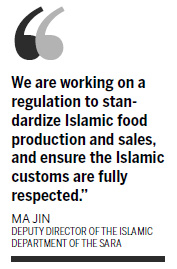Top News
Boost for Muslims' religious facilities
Updated: 2010-12-09 07:15
By Zhao Yinan (China Daily)
Increasing migrant population brings need for more mosques
BEIJING - Authorities are addressing a lack of religious facilities for millions of Muslims who have moved to coastal cities, a senior official at the State Administration for Religious Affairs (SARA) said.
 |
|
Ma Jin is deputy director of SARA’s Islamic Department. [China Daily] |
The trend has led to a growing demand for religious facilities, primarily more mosques, greater availability of Islamic food and special graveyards.
By 2008, about 3 million Muslims, or more than 10 percent of the country's total Muslim population, had migrated from rural areas in traditional Muslim-concentrated western provinces to coastal cities, according to the Annual Report on China's Religions in 2009.
More than 75 percent of Muslim migrants left their hometowns in the hope of "better payment" and prospects, according to the report.
More than 70 percent saw their income double after they moved to urban areas, ranging from 500 yuan ($75) to 2,000 yuan per month.
"Muslims who work as migrant workers, or conduct small business in eastern coastal provinces, can enhance exchanges among ethnic groups, improve ethnic unity, and promote economic development in their hometowns," Ma said.
| ||||
Guangzhou, the capital city of Guangdong province, has only four mosques to cater for about 9,800 permanent Muslim residents and another 25,000-40,000 temporary Muslim residents.
Construction of the last mosque, with a seating capacity of about 5,000 and situated near the Muslim Sages Tomb, was completed just ahead of the Asian Games which opened in early November.
Su Yipeng, a Muslim IT engineer based in Guangzhou, said that before the new mosque was built he used to pray in the open air, even in the rain.
Four mosques are still "barely enough" to meet the demand, he said.
Ma said some Muslims have to do their religious service outside crowded mosques in some coastal cities, causing not only traffic jams but also misunderstanding between Muslims and other people.
Yiwu, a city in Zhejiang province famous for trading small commodities, has about 5,000 business people from the Middle East each year. "It has transformed a factory building into a temporary mosque for the Muslims," Ma said.
He said that governments at all levels have allocated at least 74 million yuan ($11 million) to build new mosques and repair dilapidated ones over the past 10 years.
Apart from mosques, a lack of graveyards suitable for Muslim burial procedures in coastal areas is another major concern, Min Xianliang, a SARA researcher, was quoted by China Ethnic News as saying.

Currently, there are only four institutions offering funeral services for Muslims in Guangdong, and most cities in the province don't have Muslim graveyards, Min said.
Although some local governments have allocated special graveyards for Muslims, they are still "far from enough" to meet the rising demand, he said.
The problem of inadequate access to Islamic food has also troubled the migrant Muslim population.
"Substandard Islamic food is one of the causes for ethnic disputes. We are working on a regulation, the nation's first, to standardize Islamic food production and sales, and ensure the Islamic customs are fully respected," Ma noted.
According to the current policy, colleges with more than 10 Muslims should provide Islamic food. However, the policy does not extend to specific requirements for kindergartens and primary schools.
Su said there is only one primary school and kindergarten in Guangzhou for Muslims.
Yang Cheng, a press official from the State Ethnic Affairs Commission, told China Daily that the government is planning to amend the Regulations on Work for Urban Ethnic Groups, introduced 17 years ago.
The draft amendment, which aims to help cities offer better religious support for migrant ethnic people, will be discussed at a national conference in December.
E-paper

Ear We Go
China and the world set to embrace the merciful, peaceful year of rabbit
Preview of the coming issue
Carrefour finds the going tough in China
Maid to Order
Specials

Mysteries written in blood
Historical records and Caucasian features of locals suggest link with Roman Empire.

Winning Charm
Coastal Yantai banks on little things that matter to grow

New rules to hit property market
The State Council launched a new round of measures to rein in property prices.




